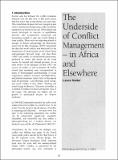| dc.contributor.author | Nader, Laura | en |
| dc.date.accessioned | 2016-02-01T14:05:22Z | |
| dc.date.available | 2016-02-01T14:05:22Z | |
| dc.date.issued | 01/01/2001 | en |
| dc.identifier.citation | Nader, L. (2001) The Underside of Conflict Management — in Africa and Elsewhere. IDS Bulletin 32(1): 19-27 | en |
| dc.identifier.issn | 1759-5436 | en |
| dc.identifier.uri | https://opendocs.ids.ac.uk/opendocs/handle/20.500.12413/8775 | |
| dc.description.abstract | Summaries This article traces the evolution of thought on dispute resolution in recent decades and takes a critical look at its latest incarnation, the alternative dispute resolution (ADR) revolution. It argues that ADR is premised on the harmony model of law that denies the unequal power of disputing parties and ignores issues of social justice. It calls for a real dialogue by serious scholars willing to examine the now plentiful evidence of the performance of ADR devices. The article also shows that dispute resolution is not autonomous from other social and economic components of social systems, and that as a consequence it is not possible to divorce law and power. Any ADR scheme, therefore, needs careful study of the social conditions in which it may operate. | en |
| dc.format.extent | 9 | en |
| dc.publisher | Institute of Development Studies | en |
| dc.relation.ispartofseries | IDS Bulletin Vol. 32 Nos. 1 | en |
| dc.rights.uri | http://www.ids.ac.uk/files/dmfile/IDSOpenDocsStandardTermsOfUse.pdf | en |
| dc.title | The Underside of Conflict Management — in Africa and Elsewhere | en |
| dc.type | Article | en |
| dc.rights.holder | © 2001 Institue of Development Studies | en |
| dc.identifier.doi | 10.1111/j.1759-5436.2001.mp32001003.x | en |

